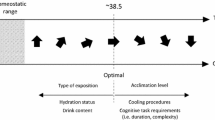Abstract
The present study investigated the relationship between objective temperature and subjective temperature preferences in predicting performance in simple and complex cognitive tasks. We assessed the impact of room temperature (warm and cold) on the ability to “update” (and monitor) working memory (WM) representations in two groups of participants, who differed in their subjective temperature preferences (warm-preferred vs. cold-preferred). Participants performed an N-back task in which conditions (1-back and 2-back) differ in their WM load and cognitive demands. Results showed that the preferred, but not the objective temperature predicts WM performance in the more resource-demanding (the 2-back) condition. We propose that subjective preferences are more reliable predictors of performance than objective temperature and that performing under the preferred temperature may counteract “ego-depletion” (i.e., reduced self-control after an exhausting cognitive task) when substantial cognitive control is required. Our findings do not only favor a cognitive approach over the environmental/physical approaches dominating the research on cognition–environment interactions, but they also have important, straightforward practical implications for the design of workplaces.

Similar content being viewed by others
References
Baumeister, R. F., Bratslavsky, E., Muraven, M., & Tice, D. M. (1998). Ego depletion: Is the active self a limited resource? Journal of Personality and Social Psychology, 74, 1252–1265.
Cheema, A., & Patrick, V. M. (2012). Influence of warm versus cool temperatures on consumer choice: A resource depletion account. Journal of Marketing Research, 49, 984–995.
Colzato, L. S., Jongkees, B. J., Sellaro, R., & Hommel, B. (2013a). Working memory reloaded: tyrosine repletes updating in the N-back task. Frontiers in Behavioral Neuroscience., 7, 200. doi:10.3389/fnbeh.2013.00200.
Colzato, L. S., van den Wildenberg, W. P. M., Zmigrod, S., & Hommel, B. (2013b). Action video gaming and cognitive control: Playing first person shooter games is associated with improvement in working memory but not action inhibition. Psychological Research, 77, 234–239.
Hammel, H. T. (1968). Regulation of internal body temperature. Annual Review of Physiology, 30, 641–710.
Hancock, P. A. (1986). The effect of skill on performance under an environmental stressor. Aviation, Space and Environmental Medicine, 57, 59–64.
Hancock, P. A., Ross, J., & Szalma, J. (2007). A meta-analysis of performance response under thermal stressors. Human Factors, 49, 851–877.
Hancock, P. A., & Vasmatzidis, I. (2003). Effects of heat stress on cognitive performance: The current state of knowledge. International Journal of Hyperthermia, 19, 355–372.
IJzerman, H., & Semin, G. R. (2009). The thermometer of social relations: Mapping social proximity on temperature. Psychological Science, 20, 1214–1220.
Kane, M. J., Conway, A. R. A., Miura, T. K., & Colflesh, G. J. H. (2007). Working memory, attention control, and the N-back task: A question of construct validity. Journal of Experimental Psychology. Learning, Memory, and Cognition, 33, 615–622.
Kang, Y., Williams, L. E., Clark, M. S., Gray, J. R., & Bargh, J. A. (2011). Physical temperature effects on trust behavior: The role of insula. Social Cognitive and Affective Neuroscience, 6, 507–515.
Miyake, A., Friedman, N. P., Emerson, M. J., Witzki, A. H., Howerter, A., & Wager, T. (2000). The unity and diversity of executive functions and their contributions to complex “frontal lobe” tasks: A latent variable analysis. Cognitive Psychology, 41, 49–100.
Pilcher, J., Nadler, E., & Busch, C. (2002). Effects of hot and cold temperature exposure on performance: A meta-analytic review. Ergonomics, 45, 682–698.
Russell, J. A., Weis, A., & Mendelsohn, G. A. (1989). Affect grid: A single-item scale of pleasure and arousal. Journal of Personality and Social Psychology, 57, 493–502.
Acknowledgments
This work was supported by research grant from the Netherlands Organization for Scientific Research (NWO) awarded to Lorenza S. Colzato (Vidi Grant: #452-12-001).
Author information
Authors and Affiliations
Corresponding author
Rights and permissions
About this article
Cite this article
Sellaro, R., Hommel, B., Manaï, M. et al. Preferred, but not objective temperature predicts working memory depletion. Psychological Research 79, 282–288 (2015). https://doi.org/10.1007/s00426-014-0558-4
Received:
Accepted:
Published:
Issue Date:
DOI: https://doi.org/10.1007/s00426-014-0558-4




